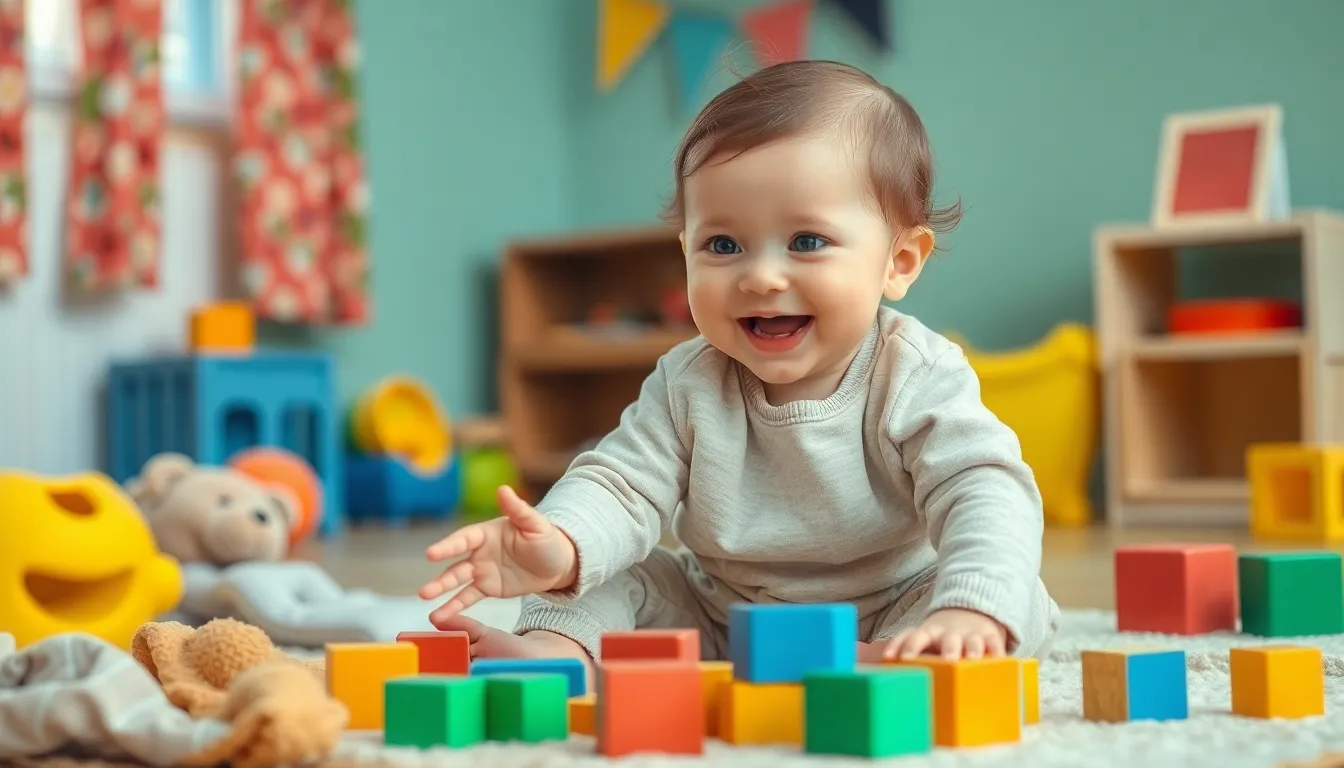Every parent knows that keeping a baby entertained can feel like a full-time job. Enter baby sensory play—the ultimate solution for curious little minds. This playful approach not only sparks joy but also stimulates a baby’s developing senses, turning everyday moments into a delightful adventure. Who knew that splashing in water or squishing playdough could be so educational?
Imagine your baby giggling as they explore textures, sounds, and colors, all while you enjoy a well-deserved break. Sensory play encourages creativity and cognitive skills, making it a win-win for both baby and parent. So grab those colorful toys and let the fun begin—because who wouldn’t want to turn their living room into a mini sensory wonderland?
What Is Baby Sensory Play?
Baby sensory play refers to activities that stimulate infants’ senses, helping them explore the world around them. This type of play engages touch, sight, sound, taste, and smell through structured activities or spontaneous interactions. Activities can include playing with textured toys, using colorful materials, or listening to music.
Sensory play fosters cognitive development and enhances motor skills in babies. Through water play, infants experience different textures and temperatures, promoting tactile awareness. Engaging with various colors and patterns through toys encourages visual stimulation. Babies can learn cause and effect while manipulating objects, reinforcing their understanding of their environment.
Many parents can incorporate everyday household items into sensory play. Ingredients like rice, pasta, or safe kitchen utensils provide an opportunity for exploration. Activities that include nature, like exploring leaves and flowers, offer new scents and textures. Groups of parents can also create sensory playdates, encouraging social interaction among babies while exploring their senses together.
Research shows that sensory play significantly contributes to language skills. Babies who engage in sensory activities often develop vocabulary faster as they learn to describe their experiences. This type of play promotes problem-solving skills, as children figure out how to manipulate materials and navigate their surroundings.
Baby sensory play is essential for growth. Parents can observe their child’s reactions and adapt activities to keep them engaged. By providing diverse sensory experiences, parents actively contribute to their child’s development and learning.
Benefits Of Baby Sensory Play

Baby sensory play offers numerous benefits that support a child’s overall development.
Cognitive Development
Cognitive skills flourish through sensory play as infants explore different materials. Engaging with textured objects stimulates curiosity, promoting problem-solving and critical thinking. Exposure to various colors and patterns enhances visual perception, facilitating learning. Research indicates that babies who participate in sensory activities often display improved memory and attention spans. These experiences form the foundation for later learning, as children make connections between their senses and the world. Opportunities for exploration significantly impact cognitive milestones during early development.
Motor Skills Enhancement
Motor skills experience substantial growth during sensory play sessions. Handling different textures like sand, water, or playdough helps develop fine motor abilities. Infants grasping, squeezing, and pouring enhance hand-eye coordination, a crucial skill for later tasks like writing. Activities that involve movement, such as reaching for objects, also support gross motor development. As babies interact with their environment, they gain greater control and dexterity over their movements. Engaging in varied sensory experiences leads to impressive motor skill advancements over time.
Emotional Well-Being
Emotional health benefits from consistent sensory play engagement. Activities provide a safe space for exploration, allowing infants to express feelings through interactions. Playing with different materials fosters a sense of accomplishment and builds self-confidence. Positive experiences during sensory play promote relaxation and reduce stress, contributing to emotional stability. These interactions also enhance bonding between caregivers and babies, enriching their relationships. As infants enjoy sensory activities, they develop essential social skills that support future interactions with peers.
Types Of Baby Sensory Play Activities
Various activities engage babies’ senses, promoting exploration and development. Engaging in specific types of sensory play enhances different skills.
Visual Stimulation
Bright colors attract infants’ attention and stimulate visual development. Using colorful toys, sensory books, and textured fabrics provides ample opportunity for babies to explore various patterns. Simple items, like colored scarves or light projections, add visual interest. Parents can create a visually stimulating environment by placing contrasting colors nearby. Regular exposure to engaging visuals helps improve focus and tracking skills. Engaging with different shapes and sizes also encourages spatial awareness. Ultimately, visual play lays a foundation for cognitive growth.
Tactile Exploration
Tactile exploration is essential for developing fine motor skills. Materials like sand, rice, and soft fabrics invite babies to touch and manipulate. Parents can create sensory bins, filling them with various items for babies to explore. Experiencing different textures expands their understanding of the physical world. Textured balls or squishy toys promote gripping and squeezing, enhancing hand strength. Incorporating nature items like leaves or pinecones diversifies textures. Opportunities for tactile engagement result in increased curiosity and problem-solving skills.
Auditory Experiences
Auditory experiences expose babies to different sounds, aiding language acquisition. Rattles, music, and nature sounds spark auditory exploration. Exposing infants to various musical instruments fosters an appreciation for rhythm and melody. Singing or playing soft music creates a calming atmosphere, supporting emotional well-being. Reading aloud introduces new vocabulary, enhancing language development. Incorporating sounds from everyday life, like a washing machine or clock ticking, offers diverse auditory experiences. Regular auditory engagement strengthens listening skills and encourages interaction.
Tips For Implementing Baby Sensory Play
Implementing baby sensory play requires thoughtful planning. Creating an engaging environment fosters exploration and promotes safety.
Creating A Safe Environment
Safety ranks as the top priority when setting up sensory play. Soft surfaces like blankets or mats protect babies from falls during play sessions. Removing small items prevents choking hazards. It’s essential to supervise infants closely, especially when introducing new materials. Ensuring all items are non-toxic supports health and safety. A clean space will also enhance the experience, as dirt can pose health risks. Parents can designate a specific area for sensory play, reducing distractions and allowing babies to focus on their activities.
Choosing The Right Materials
Selecting appropriate materials significantly impacts the sensory experience. Opt for a variety of textures like soft fabrics, smooth plastics, and rough natural elements. Popular choices include water, sand, rice, and playdough, as they provide rich sensory experiences. Brightly colored items stimulate visual engagement, while scented materials can introduce new olfactory experiences. Parents should ensure all materials are age-appropriate and safe for infants to explore. Regularly rotating materials keeps play fresh and exciting, encouraging babies to explore new sensations continuously. Exploring nature-based materials boosts curiosity and enriches the sensory experience.
Embracing baby sensory play can transform everyday moments into valuable developmental experiences. By engaging infants in activities that stimulate their senses, parents foster creativity and cognitive growth while strengthening their bond with their child.
With simple materials and a safe environment, parents can encourage exploration and curiosity. The benefits extend beyond just entertainment; sensory play supports language development and enhances motor skills.
As parents incorporate these activities into their routines, they’ll witness their baby’s growth and joy. Sensory play is not just an activity; it’s a pathway to nurturing a child’s potential.





